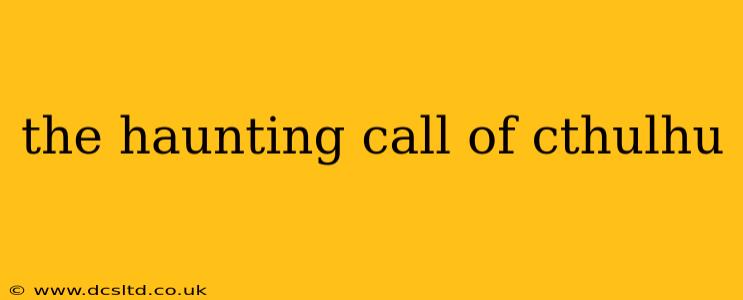H.P. Lovecraft's "The Call of Cthulhu" isn't just a story; it's a cornerstone of cosmic horror, a genre he essentially invented. This chilling tale of an ancient, monstrous entity lurking beneath the waves continues to resonate with readers and filmmakers alike, prompting countless questions and interpretations. This deep dive will explore the story's enduring power, examining its themes, symbolism, and lasting influence on literature and popular culture.
What is Cthulhu?
Cthulhu, the titular entity, is less a character and more a force of nature, a cosmic being of unimaginable power and alien design. He's a creature of immense size and unsettling features, described with grotesque detail that evokes a sense of primal dread. He's not simply evil; he's indifferent, existing outside of human comprehension and morality. His very existence challenges our place in the universe, highlighting our insignificance in the grand cosmic scheme. This unknowable nature is what makes him so terrifying.
What is the significance of the dream sequences in "The Call of Cthulhu"?
The recurring dream sequences, featuring the monstrous Cthulhu, are crucial to the story's effect. They highlight the subconscious nature of the cosmic horror Lovecraft presents. These dreams aren't simply nightmares; they are glimpses into a reality beyond human perception, a reality where Cthulhu's power subtly influences the world. The dreams' unsettling visuals and repetitive nature underscore the pervasive and inescapable nature of Cthulhu's influence, hinting at the insignificance of humanity in the face of such ancient, cosmic powers. The protagonist's sanity is gradually eroded by these visions, demonstrating the overwhelming psychological impact of confronting the unimaginable.
What are the key themes explored in "The Call of Cthulhu"?
Several significant themes underpin "The Call of Cthulhu," including:
- The insignificance of humanity: Lovecraft presents humanity as utterly insignificant in the vastness of the cosmos, a tiny speck facing unimaginable cosmic forces beyond our understanding or control.
- The unknowable nature of the universe: The story explores the fear of the unknown and the unsettling realization that there are things beyond our comprehension, forces so powerful and alien they defy human understanding.
- The fragility of sanity: The protagonist's gradual descent into madness emphasizes the psychological impact of confronting the truly horrific, suggesting that the human mind is ill-equipped to handle the reality of cosmic horror.
- The persistence of ancient evils: Cthulhu's ancient slumber and potential return highlight the timeless nature of cosmic threats, suggesting that some evils are too powerful and ancient to be truly defeated.
Why is "The Call of Cthulhu" still relevant today?
"The Call of Cthulhu" remains relevant because its themes of the unknown, the insignificance of humanity, and the fragility of sanity continue to resonate with readers. In a world grappling with complex scientific discoveries, existential anxieties, and the vastness of the universe, Lovecraft's exploration of cosmic horror taps into deep-seated fears about our place in the cosmos. The story's enduring power lies in its ability to evoke a sense of dread and wonder, reminding us of the limits of human understanding and the potentially terrifying realities that may exist beyond our comprehension.
Is Cthulhu a god?
While often referred to as a god, Cthulhu is more accurately described as a powerful entity within a pantheon of similar beings in Lovecraft's Mythos. He lacks the traditional attributes of a deity like benevolence or concern for humanity. He's a force of nature, a cosmic entity whose existence is a threat to humanity's understanding of itself and the universe.
How does Lovecraft create a sense of dread and suspense in "The Call of Cthulhu"?
Lovecraft masterfully builds suspense and dread through several techniques:
- Implied horror: He often hints at the horrors to come rather than explicitly describing them, leaving much to the reader's imagination.
- Grotesque imagery: His detailed descriptions of Cthulhu and other monstrous entities create a visceral sense of revulsion and fear.
- Unreliable narration: The protagonist's sanity is questionable, adding another layer of uncertainty and dread.
- Cosmic indifference: The utter indifference of the cosmic entities to humanity's fate adds a chilling layer of helplessness and dread.
"The Call of Cthulhu" is more than just a horror story; it's a philosophical exploration of humanity's place in a vast and potentially hostile universe. Its enduring legacy lies in its ability to evoke a primal fear of the unknown and the humbling realization of our own insignificance in the face of cosmic forces far beyond our understanding. The haunting call of Cthulhu continues to echo in the minds of readers decades after its publication, a testament to Lovecraft's enduring power as a master of cosmic horror.
